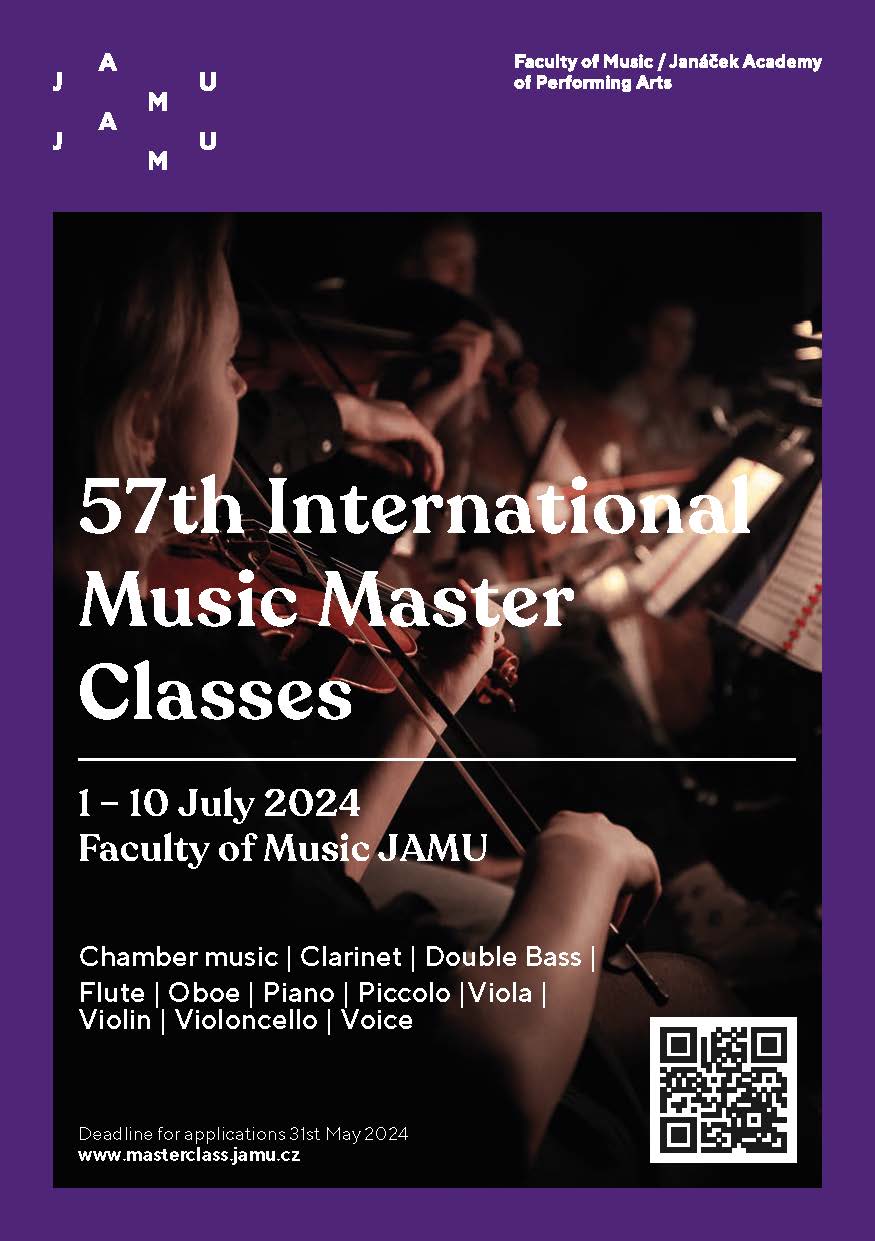Jan Jiraský
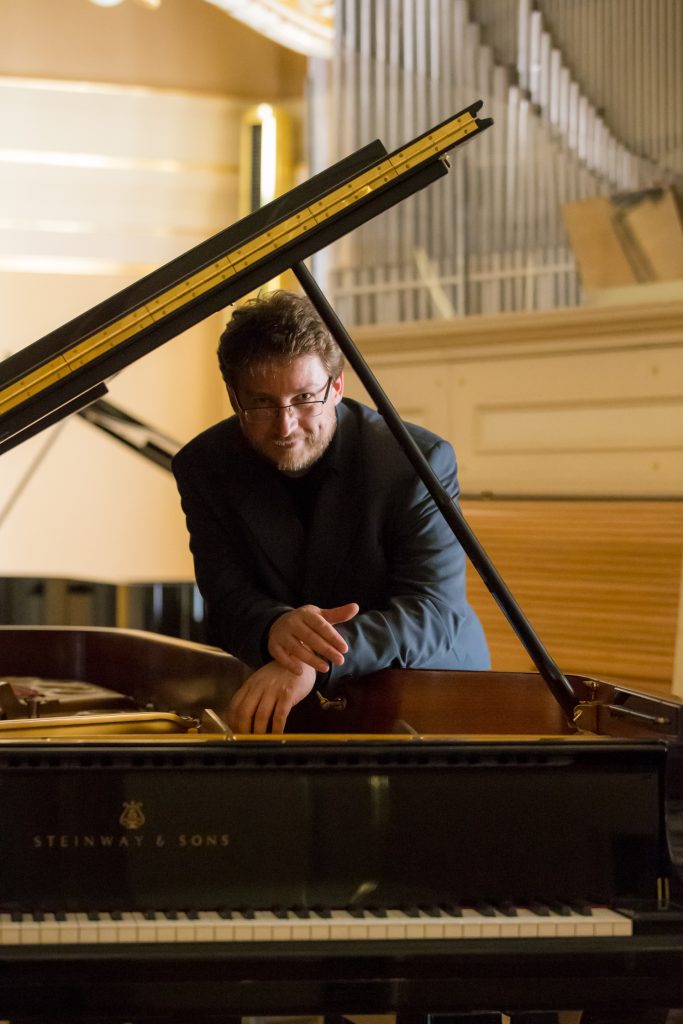
During his studies at the Pardubice Conservatory and the Brno JAMU (prof. Alena Vlasáková) Jan Jiraský became a laureate of many international competitions (Beethoven, Smetana, Karlovy Vary, Noyers, Darmstadt, Novi Sad, Kiev) and subsequently a guest of festival stages (Brno, Prague, Vienna, Saarbrücken, Darmstadt, Apeldoorn, Oristano, Vicenza, Lublin, Beijing, Madeira…).
At the age of twenty he recorded his debut CD for the Vienna-based Musica label. Radio, television and four other CD recordings followed, and his Lisbon recital at the Teatro Nacional de São Carlos was broadcast on twelve European radio stations. His recordings for Czech Television include the Haas Suite, live recordings of Martinů’s 3rd Concerto with the Brno State Philharmonic, the Hummel Concerto Op. 85 with the Virtuosi di Praga and a recording of a recital at the Moravian Autumn Festival, and in 2000 he received the prestigious Classic Award of the Czech Music Fund in the categories Talent under 30 and Performance.
He has performed at most of the Czech prestigious festivals (including the Prague Spring) and in the cycles of prestigious orchestral houses, including the Czech Philharmonic, and has performed a repertoire of twenty piano concertos with orchestras under the batons of great conductors (Ch. Arming, J. Bělohlávek, D. Bostock, A. Ceccato, G. Emilsson, J. Hrůša, M. Košik, T. Koutník, M. Lebel, Ch. Olivieri-Munroe, A. Schwinck, L. Svárovský, J. Stárek, R. Stankovský, J. Štrunc, A. Tali, F. Vajnar, V. Válek, A. Weiser, H. Wolf…).
In the field of chamber music he has collaborated with the Janáček Quartet, Martinů Quartet, Brno City Quartet, members of the Pavel Haas Quartet, members of the Wallinger Quartet, singers J. Březina, M. Lehotský, R. Novák, H. Minutillo, with actors L. Lakomý, R. Lukavský, J. Tříská, J. Potměšil and many instrumentalists.
After 2000 he performed large repertoire sets, some of them as the first Czech pianist ever, e.g. Bach’s Well-Tempered Piano (Rudolfinum, World Piano Works series) or Mozart’s 18 Sonatas (Mozart Hall of the National Theatre of the National Theatre of Prague). In addition to opuses of Chopin and Debussy etudes and several premieres of contemporary works, he has also staged and book-analyzed Janáček’s piano works, which he recorded to international critical acclaim, both on a modern instrument (ArcoDiva) and on the composer’s original Ehrbar (Radioservis). He is currently a professor of piano and the head of the Department of Piano Performance at the Janáček Academy of Performing Arts in Brno.
Teaching description
The best performance courses are of little importance in your life compared to the many years of teaching your teachers, who invest their art and their „emotional energy“ in you. The few days of classes are more for expanding your horizons, gaining inspiration and learning new ways of thinking about music, working on yourself, practicing.
The courses are mainly used by conservatory students to prepare for competitions and exams at the academy. Occasionally, university students also come, and rarely, above-average talented pupils from the ZUŠ, usually with their teachers or parents. Foreign participants often come especially to work on Czech music with Czech teachers; in a global sense, we are talking about European musical tradition and personal contact, which simply cannot be replaced by information from the Internet.
I work with each active participant on their repertoire in the presence of other participants, including passive participants (students, teachers, possibly partners, parents – all are welcome). We can, of course, send any audience members to another class or to a walk-in if the playing student expresses a reluctance to be heard by everyone beforehand. But! Many of the principles are better understood just as listeners in the audience than as players. Thus, even passive participation or listening to the lessons of colleagues has a deeper meaning.
In teaching, we address the usual fundamental issues (characters and their contrasts, form construction, phrasing, physical freedom, the joy of playing, breathing…) as well as some details of style and higher craft (articulation, pedalling, ornamentation, technical rephrasing, fingering…). I try to progress from the whole to the detail and from the essential to the less essential. Thus, from the understanding of the musical language of a given composer (semantics) we move towards its most beautiful and authentic expression (aesthetics, stylistics) by the most effective means (technique). The „what“ determines the „how“ and we need to know the „why“.
In order to realize the inner sound idea, we spend a lifetime learning to master two basic quantities: sound and time. These enable us to work with both the timbre and the length of the tone – to cultivate the so-called sonic will, with the help of which (science is short on this) we are able to transmute the percussive character of the piano sound into a singing one and to sustain long lines. But how do we reconcile this with „harmonic chemistry“, tension and release, lively rhythm and movement? Can one hand prefer the vertical aspect and the other the horizontal? (Mozart, Chopin)
Another important value for the performer is the surrounding space and the relationship to it – centripetal or centrifugal status. Do we impose or do we listen? How can this dimension help develop the threefold mode of our musical expression – rhetoric, mysticism, dance?
Many students have problems with excessive stage fright and cannot concentrate on stage to express themselves musically. Is your obstacle low self-esteem or high ego? Or is it the lack of actual awareness of why you are playing, why you exist? There are positive aspects to stage fright, it can’t be eradicated with analgesics. So we’re looking for a healthy motivation for public speaking. Are there any ways to dissolve the paralyzing form of stage fright and replace it with something more correct and very pleasant?
Often our freedom of expression is hindered by common incorrect technical habits from childhood, a subconscious desire for greater virtuosity and a lack of fleetness of movement, its fluidity and „slowness“. „Fast“ and hard hands, constant static tension, fixation in the „ideal position“, self-conscious fingers, all this is a lifelong enemy of the realization of our ideas.
Why doesn’t it „sound“ to me? When do we play down and when do we play up? How do we achieve soft forte and colorful piano?
Above all, we work on attitude towards music, musical logic, grammar, listening to the piano tone and perceiving the feelings while playing. But will the technique itself adapt to our goals?
Another aspect is stylistic instruction in performance. How can the old schools (C. Ph. E. Bach, L. Mozart, D. G. Türck) help us? The historical instrument, the Graf piano (c. 1825), which we have at our disposal for teaching, is also helpful. How must Beethoven or Schubert have felt when they played their sonatas and what did it sound like then?
The course also includes two lectures with demonstrations. The topics are chosen by you, the students. E.g. Speech in Music – Music in Speech (recommended), Bach’s Well-Tempered Piano, How to Play Scarlatti, Chopin’s Etudes, Janáček’s Piano Works, On the Cream Interpretation, Mozart Sonatas, etc. Of course, interpretation can be adapted to current issues and repertoire, applied to the pieces you play, and any discussion is welcome.
If we want to be worth something in music, let us strive to be good people first, then good musicians, and only then good pianists…
František Kantor
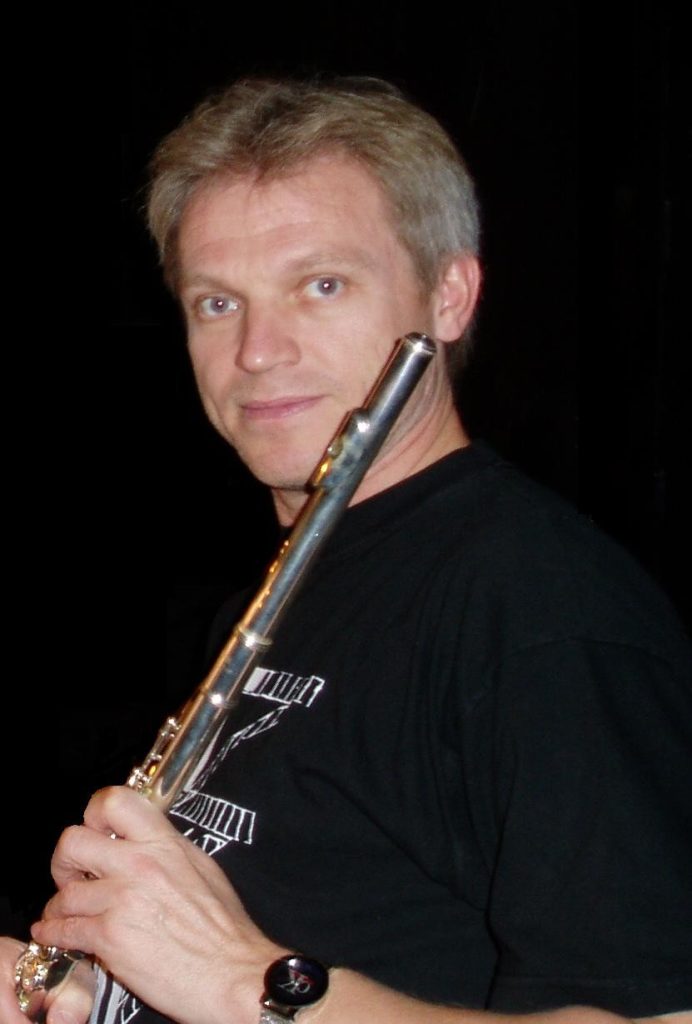
He studied flute at the Brno Conservatory and the JAMU in Brno. During his studies he won an honourable mention at the Prague Spring International Performance Competition (1981) and performed at the Talentinum International Music Festival.
He has given numerous concerts as a soloist with orchestras (Brno Philharmonic, Moravian Philharmonic Olomouc, North Bohemian Philharmonic Teplice, Bohuslav Martinů Philharmonic Zlín), recorded for Czech Radio and Czech Television. He has worked in the NDB Opera Orchestra as a piccoloist and as 1st flute, today he is a solo piccoloist in the Brno Philharmonic.
He is intensively involved in chamber music. He is a member of the Foerster Wind Quintet, for more than 25 years he has been active in the Camerata brunae ensemble promoting baroque music on domestic and international stages. He also performs in a duo with guitarist Vladislav Bláha and performs with the Czech Virtuosi orchestra. He is active in many musical genres, be it jazz, folk, pop or avant-garde music. He often performs with orchestras as a soloist with rock and jazz repertoire in the programs of conductor Miloš Machek.
He is a teacher at the Faculty of Music of JAMU. In his MIK lessons he focuses on methodological work (tone creation, breathing, dynamics versus intonation, finger technique) and especially on the issue of understanding the tectonics of a musical work. His course includes lessons on the piccolo with a focus on solo and orchestral literature and a lecture on the interpretation of Baroque music with a focus on free variations.
Pavel Tylšar
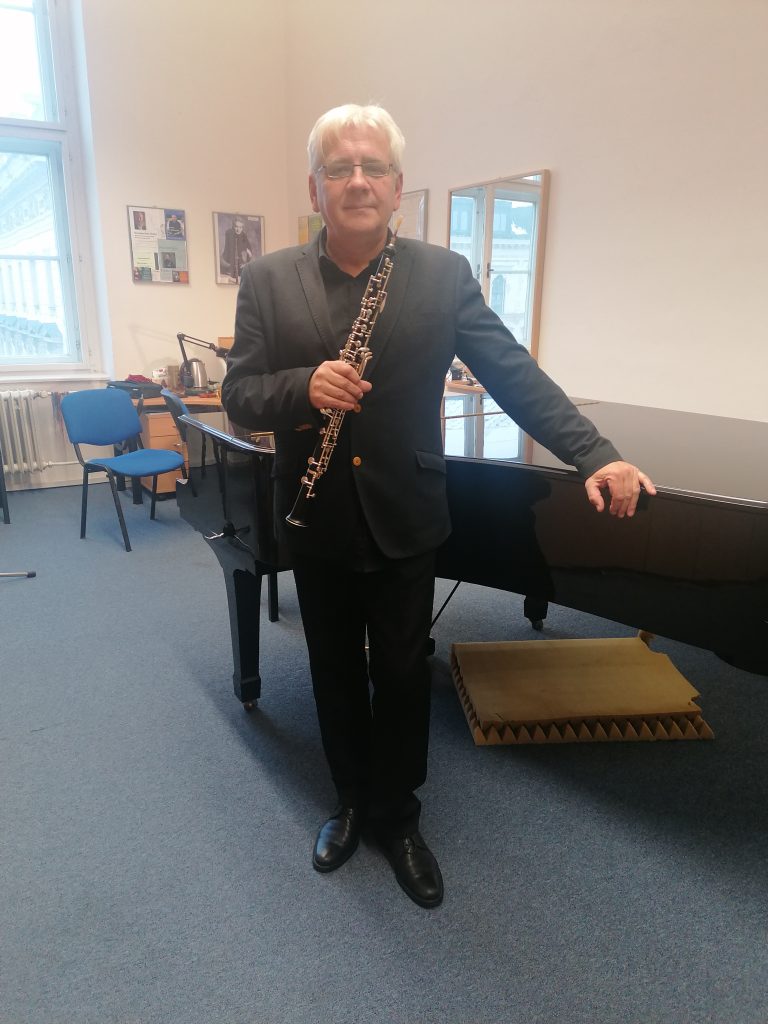
I was born 12.6.1964 in Zlin. After finishing my primary education I graduated from the Prague Conservatory and HAMU in Prague in the field of oboe. During my studies I participated in a number of national and international performance competitions, including the international competition Prague Spring (1986,1990), where I won several important awards and laureate titles.
Artistic activity
As a professional oboe player I have performed in the following orchestral ensembles:
Bohuslav Martinů Philharmonic Orchestra Zlín (1983-1984)
Prague Chamber Orchestra (1985-1999)
Orchestre Solistes Européens de Luxembourg (1991-2011)
Orchestra of the National Theatre Opera in Prague (2000-2020)
In addition, I have been a regular guest of the orchestras of the Czech Philharmonic Orchestra, FOK and Czech Radio.
As a soloist I have performed with the FOK, Philharmonie B. Martinů Zlín, Pilsen Philharmonic, Prague Conservatory Symphony Orchestra, etc.
Pedagogical activity
My pedagogical activity dates back to 1998, when I started teaching at the Gymnasium with a musical focus (today GMHS) and since 2004 I have been teaching at the Prague Conservatory. At both schools I teach oboe as the main subject, chamber music, orchestral playing, methodology and pedagogy of playing wind instruments.
Former and current students of my oboe class are regularly awarded at Czech and international performance competitions (most recently Martin Daněk – winner of the Prague Spring Festival) and are performing in Czech and European orchestras, chamber ensembles and also as soloists. Since 2016, I have been teaching oboe and wind instrument methodology at the Faculty of Music of JAMU.
František Novotný
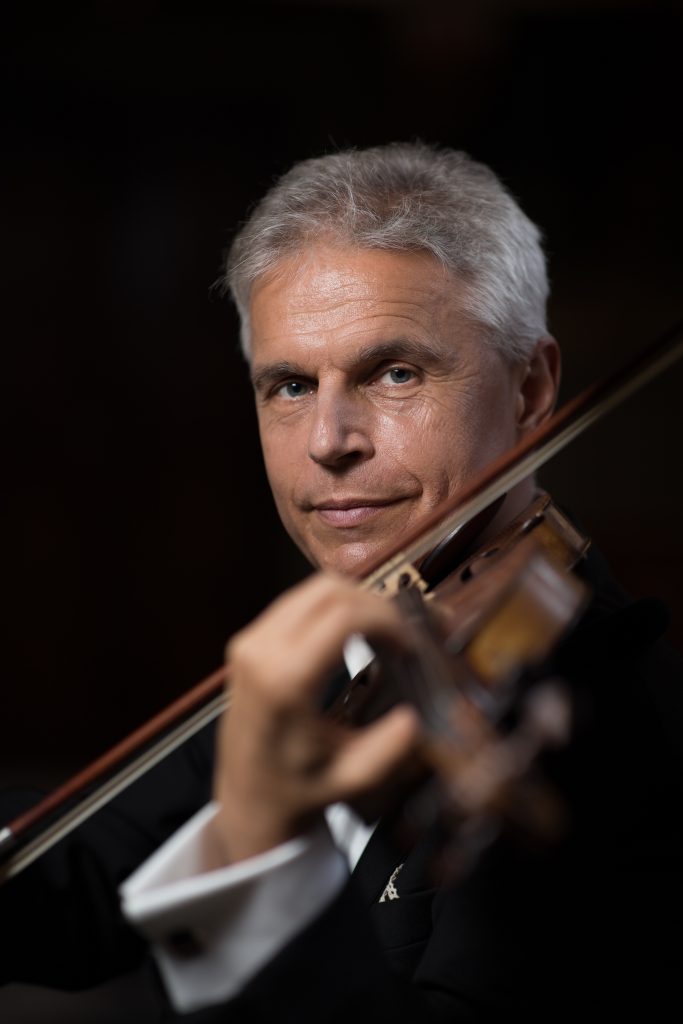
He was born in Znojmo, where he began attending the LŠU (today’s ZUŠ) under Ladislav Pospíchal. He then perfected his violin playing at the Brno Conservatory with Prof. Bohumil Kommel Sr., at the Janáček Academy of Performing Arts in the class of Prof. Bohumil Smejkal and with leading virtuosos and teachers Zakhar Bron and Viktor Tret’yakov.
He has won prizes, laureate titles and special awards in more than twenty competitions (e.g. Kocian Competition, Concertino Praga, Beethoven Competition in Hradec, Shevchikov Competition in Písek, P. I. Tchaikovsky Competition in Moscow, Prague Spring, Premio Paganini in Genoa, International Competition in Tokyo…) He is the recipient of the RAI Prize and the Henryk Wieniawski Medal.
His extremely wide repertoire (e.g. more than sixty solo titles with orchestra) is used in cooperation with leading symphonic ensembles in the Czech Republic (PKF, ČF, Prague Symphony Orchestra FOK, SOČR, FB…) and abroad.
In addition to performing on the domestic scene (Prague Spring, Moravian Autumn, Janáček May…), he performs on the major stages of European countries (Armenia, Belgium, France, Italy, Cyprus, Luxembourg, Poland, Spain, Sweden, Switzerland, Austria, Germany, Holland, Great Britain), Japan (Suntory Hall, Tokyo Bunka Kaikan, Izumi Hall…) and the United States (Carnegie Hall…).
In 2009 he was awarded the title of university professor by the President of the Czech Republic.
He is regularly invited to the juries of national and international violin competitions in the Czech Republic and abroad (e.g. Prague Spring, KHS, Telemann Competition – Poznan, Ernst-Szymanowski – Wroclaw…).
He also cooperates as an expert advisor with the Bärenreiter publishing house.
Along with the traditional repertoire, he also presents lesser-known or completely unknown works by international composers. In addition to works for solo violin (Jan Novák…) or violin and piano (A. Copland…), he has given Czechoslovak and Czech premieres of Bernstein’s Serenade after Plato’s Symposium, violin concertos by S. Barber, M. Rózsa, A. Berg and E. W. Korngold (the first Czech release of the violin concerto on CD, 2008).
Among František Novotný’s significant interpretative and dramaturgical achievements is the release of a CD with the complete works of A. Dvořák for violin and orchestra and a violin concerto by J. Brahms with conductor Jiří Bělohlávek, as well as a CD with sonatas by E. W. Korngold and Rich. Strauss, which František Novotný recorded together with pianist Serguei Milstein (laureate of many international piano competitions), with whom he has been collaborating since 1993. The double-CD with the complete violin works of E. Bloch, the CD of violin gems IN ARMONIA and the double concertos for violin and piano by Mozart and Mendelssohn were also considered unique.

